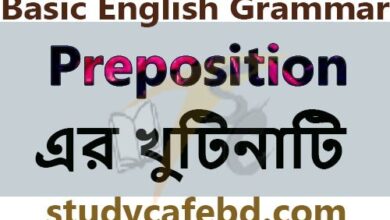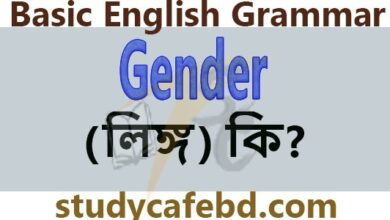Adjective কাকে বলে? Adjective কত প্রকার ও এর ব্যবহার?
Table of Contents
Adjective কাকে বলে ও Adjective চেনার উপায়
যে শব্দ দ্বারা কোন Noun বা Pronoun এর দোষ, গুণ, অবস্থা, সংখ্যা, পরিমাণ ইত্যাদি প্রকাশ করে তাকে Adjective বলে।
More Definition of Adjective
The word which expresses the real condition of noun and pronoun is called Adjective.
-Dr. Sazzad Hossain.
An adjective is a word used to qualify a noun or a pronoun.
-J.C. Nesfield
An adjective is a word used to add something to the meaning of a noun.
-Wren & Martin
যেভাবে Adjective চেনা যায়
শব্দের শেষে সাধারনত al, ic. id. ile, tive, ish, ian. ed. able, ful. less, ry, ous প্রভৃতি suffix থাকে।
যেমনঃ
- basic, fertile, fatal, creative, helpless, dangerous.
Note: Noun এর শেষে ly, Suffix যুক্ত হলে তা সব সময় Adjective হয়।
যেমন:
- Brother brotherly,
- Father fatherly,
- Sister- sisterly.
- Mother motherly,
- Friend friendly.
- Time- timely,
- Home– homely,
- Love- lovely,
- Man- manly,
- woman- womanly.
Note: মনে রাখবেন নিচের প্রভৃতি শব্দগুলো ly যুক্ত হওয়া সত্তে adverb না হয়ে adjective এর কাজ করে।
যেমনঃ:
- Lonely, womanly, manly, costly, lovely, lively, friendly, ugly, timely, jointly, homely, curly etc.
Adjective কত প্রকার ও কি কি?
May be classified into the following kinds
যেমন:
- Adjective of quality
- Adjective of quantity
- Adjective of number
Adjective of quality কাকে বলে?
যে Adjective দ্বারা ব্যক্তি বা বস্তুর গুণ দোষ বা অবস্থা প্রকাশ পায় তাকে Adjective of quality বলে।
যেমনঃ
- He is an honest man.
Adjective of quantity কাকে বলে?
যে Adjective দ্বারা পরিমাণ নির্দেশ করে তাকে Adjective of quantity বলে।
যেমনঃ
- He drank a little water.
Adjective of number কাকে বলে?
যে Adjective দ্বারা কোন Noun এর সংখ্যা ক্রমানুসারে স্থান বা পর্যায় বুঝায় বা Noun টি কত বার আছে তা প্রকাশ করে, তাকে Adjective of number বলে।
যেমনঃ
- There are five teachers in our school.
- He is the first boy in our class.
Note : উপরের ১ম sentence টিতে five এই adjective টি teacher এই Noun টির সংখ্যা, দ্বিতীয় sentence এর first এই Adjective টি boy এই Noun টির ক্রমানুসারে স্থান বা পর্যায় (order) প্রকাশ করে।
তাই five ও first এ Adjective গুলি Adjective of number বা Numeral Adjective বলে।
Numeral Adjective কত প্রকার
Numeral Adjective তিন প্রকার:
যথা:
- Cardinal.
- Ordinal
- Multiplicative
Cardinal Numeral Adjective কাকে বলে?
One, two, three, four ইত্যাদি যে সকল Adjective দ্বারা কোন Noun এর নির্দিষ্ট সংখ্যা বুঝায় তাকে Cardinal Numeral Adjective বলে।
যেমনঃ
- One. two. three, four. six, seven, eight, nine, ten, etc.
Ordinal Numeral Adjective কাকে বলে?
First, second, third ইত্যাদি যে সকল Adjective দ্বারা Noun এর ক্রমানুসারে স্থান বা পর্যায় বুঝায় তাকে Ordinal Numeral Adjective বলে
যেমনঃ
- First, second, third, fourth, fifth, etc.
Multiplicative Numeral Adjective কাকে বলে?
Single, double, triple ইত্যাদি যে সকল Adjective দ্বারা কোন একটি Noun কতবার রয়েছে বুঝায় তাকে Multiplicative Numeral Adjective বলে ।
যেমনঃ
- Single, double, triple, fourfold, fivefold. etc.
Pronominal Adjective কাকে বলে?
কোন Pronoun যখন Noun এর পূর্বে বসে Adjective এর কার্য সম্পাদন করে তখন তাকে Pronominal Adjective বলে ।
যেমনঃ
- Which pen do you want?
This type of adjective derived from pronouns which include the following:
Demonstrative adjective
This pen is mine. That pen is yours.
Definite adjective
The book you gave me has been stollen.
Indefinite adjective
Any pen will do.
Distributive adjective
Each/ Every boy will get a prize.
Interrogative adjective
Which party do you support?
Possessive adjective
My/ Your/ His/ Her car is costly.
Relative adjective
He lent me what / whatever money he
Exclamatory adjective
What a bird it is!
Adjective এর কাজ
Adjective- এর কাজ হচ্ছে Noun- এর দোষ গুণ প্রকাশ করা। Adjective Determiner-এর পরে ও Noun- এর আগে বসে।
যেমনঃ
- He is a good boy.
এই বাক্যে good শব্দটি Adjective এবং boy শব্দটি Noun এবং a শব্দটি Determiner.
সুতরাং বুঝাই যাচ্ছে যে, Adjective Determiner-এর পরে ও Noun-এর আগে বসে।
যেখানে Adjective বসে
✔️Noun এর পূর্বে Adjective বসে।
যেমনঃ
- He is a smart boy. (Adjective + Noun)
✔️Article এবং Noun এর মাঝে Adjective বসে
যেমন :
- America is a developed country (Article + Adjective + Noun)
✔️Preposition এবং Noun এর মাঝে Adjective বসে।
যেমনঃ
- They learn from western culture. (Preposition + Adjective + Noun)
Note: মনে রাখবেন কেমন অর্থে বাক্যের যেখানেই শব্দ ব্যবহৃত হোক সেখানেই Adjective বসাতে হবে ।
যেমনঃ
- He is an active man.
এখানে সে কেমন মানুষ?
এই প্রশ্নের উত্তর হিসেবে কোন শব্দ আনতে হচ্ছে হিসেবে শব্দটি আসতে পারে কর্মপরায়ণ মানুষ (Active)। একটি গুণবাচক শব্দ বা Adjective.
More examples:
Mr. Khan leads a luxurious life in London.
প্রশ্ন : কেমন জীবন? উত্তর– বিলাসবহুল (luxurious)
Standard educational institutions are very expensive in London.
প্রশ্নঃ কেমন প্রতিষ্ঠান? উত্তর– শিক্ষামূলক (educational)
It is my personal matter.
প্রশ্নঃ কেমন বিষয়? উত্তর– ব্যক্তিগত (personal)
The miserable condition of a rickshaw puller beggars description.
প্রশ্নঃ কেমন অবস্থা বর্ণনাতীত? উত্তর- শোচনীয় (miserable)
It is my annual examination.
প্রশ্নঃ কেমন পরীক্ষা? উত্তর– বার্ষিক (annual)
The Sangsad Bhaban is a wonderful structure of world.
প্রশ্নঃ কেমন নির্মাণ? উত্তর– সুন্দর/ বিস্ময়কর (wonderful)
The symbolic significance of iron Bridge was great.
প্রশ্নঃ কেমন গুরুত্ব? উত্তর– প্রতিকী (symbolic)
The green house effect is a global phenomenon.
প্রশ্নঃ কেমন বিষয়? উত্তর– বিশ্বময় (global)
At present change is noticed in the various cultural groups in Kenya.
প্রশ্নঃ কেমন দলে? উত্তর– সাংস্কৃতিক (cultural)
Women became influential in family affairs.
প্রশ্নঃ কেমন হয়েছিল? উত্তর- প্রভাবশালী (influential)
Note: এছাড়া দোষ, গুণ, পরিমাণ, সংখ্যা বা অবস্থা দ্বারা Adjective প্রকাশ করা যায়।
যেখানে Adjective বসে
✔️মনে রাখবেন Adjective সাধারণত noun -এর আগে এবং link verb-এর পরে complement হিসেবে বসে।
যেমনঃ
- Before noun= He leads a luxurious life.
- After the link verb– He is getting smart.
[su_box title=”নিচের Adjective গুলো link verb-এর পরে বসে।” style=”glass” box_color=”#0b0401″ title_color=”#f6f0f1″]afraid, asleep, alive, alone, aware, content, glad, ill, unwell, ready, sorry, sure. unable, well, ashamed, pleased, fine, happy.[/su_box]
যেমনঃ
- I am fine.
[su_box title=”নিচের Adjective গুলো noun-এর আগে বসে।” style=”glass” box_color=”#0b0401″ title_color=”#f6f0f1″]western, southern, eastern, northern. outdoor, indoor, atomic, digital, countless. existing. introductory, maximum, occasional, main, chief, principal, inner, outer, upper, former, elder. eldest, oldest. This is the western part of Bangladesh.[/su_box]
Order of Adjectives
✔️Opinion adjective + descriptive adjective আকারে বসে।
যেমন:
- He puts on a beautiful black shirt.
(beautiful opinion adjective: black descriptive adjective)
✔️General opinion adjective + specific opinion adjective আকারে বসে।
যেমন:
- I am sitting in a lovely comfortable chair.
[Adjectives like good, bad, nice, lovely, horrible etc indicate general opinion whereas adjectives like comfortable, cosy, clean, dirty indicate specific opinion]
Noun Adjectives কাকে বলে?
যখন একটি noun আর একটি noun কে pre-modify করে, তাকে noun adjectives বলে।
যেমন:
- He is a school teacher.
- It is a mango tree.
Adjectives কখন Noun হিসাবে বসে।
কখনো কখনো Group of people-কে নির্দেশ করতে Adjective. Noun রূপে ব্যবহৃত হয়। এক্ষেত্রে verb-এর plural number হয় এবং adjective-এর পূর্বে the বসে।
যেমনঃ
- The rich are not always happy.
- The pious are always happy.
[su_box title=”Note : সাধারণত কিছু common adjectives যা noun হিসেবে ব্যবহার করা যায়।” style=”glass” box_color=”#0b0401″ title_color=”#f6f0f1″]the rich. the poor, the strong, the weak. the privileged, the disadvantaged, the unemployed, the homeless, the hungry, the blind, the deaf, the sick, the disabled, the handicapped, the living. the dead, the young, the middle aged, the elderly, the old, the industrious.[/su_box]
✍️Note : সাধারণত কিছু কিছু Adjectives এর পরে ‘to’ infinitive বসে।
যেমনঃ
- I am happy to see you again.
- It is important to read the book.
- It is easy to criticize someone.
- He is ready to forget the matter.
Comparison of Adjectives
Rana is a tall boy
রানা একটি লম্বা ছেলে।
Rana is taller than Hasan
রানা হাসানের চেয়ে লম্বা
Rana is the tallest boy in our class
রানা আমাদের শ্রেণীর সবচেয়ে লম্বা ছেলে।
উপরের বাক্যগুলিতে tall, taller এবং tallest তিনটি Adjective; এদের মধ্যে প্রথম বাক্যে tall Adjective-টি সাধারণভাবে বসেছে, দ্বিতীয় বাক্যে taller Adjective-টি দুজনের মধ্যে তুলনা বোঝাচ্ছে এবং তৃতীয় বাক্যে tallest Adjective-টি সকলের মধ্যে তুলনা বোঝাচ্ছে।
এইভাবে সাধারণ Adjective- থেকে দুই এর মধ্যে তুলনা এবং দুই এর বেশির মধ্যে তুলনা বোঝাতে Adjective- এর যে রূপ হয়, তাকে Degree of Comparison বলে
এইভাবে Adjective এর তিনটি form বা রূপ হল
Positive Degree:
Adjective যখন সাধারণভাবে বসে।
Comparative Degree:
Adjective যখন দুটি ব্যক্তি বা বস্তুর মধ্যে তুলনা করা হয়।
Superlative Degree:
Adjective যখন দুইয়ের অধিক ব্যক্তি বা বস্তুর মধ্যে তুলনা করা হয়।
Adjectives এর কিছু ব্যবহার
Little, a little, the little এর ব্যবহার
✔️Little has a negative sense and means not much. (little না বোধক ও খুব কম অর্থে বসে)।
I have little money to spend (not much money)
✔️A little has an affirmative sense and means some at least (a little হ্যাঁ বোধক ও কিছু আছে অর্থে বসে)।
I have a little money to survive. (some money at least though not much)
✔️The little has two meanings- one negative and another affirmative. (the little হ্যা ও না বোধক অর্থ বোঝায়)।
He drank the little water he had.
It may mean
Negative:
He had not much water to drink.
Affirmative:
He drank the whole quantity of water.
Few, a few, the few এর ব্যবহার
✔️Few has a negative sense and means not many: (few না বোধক ও কিছু আছে অর্থে বসে)।
I had few books. (not many)
✔️A few has a positive sense and means at least some though not many: (a few হ্যা বোধক অর্থে বসে যদিও খুব বেশি নয়)।
I had a few books to read. (at least some books, not many)
✔️The few has two meanings-one negative and another positive/affirmative. (the few দ্বারা হ্যা ও না বোধক অর্থ বোঝায়)
I sold the few books I had.
It may mean-
Negative:
I had not many books to sell.
Affirmative :
I sold all the books I had.
Less & lesser এর ব্যবহার
✔️Less is used both as an adverb and an adjective.
Hena is less beautiful than Jui. (adverb)
She got less marks than her sister. (adjective)
✔️Lesser is used only as an adjectives.
Of poverty and disease, the latter is lesser evil.
Less & Fewer এর ব্যবহার
✔️Less & Fewer: (less দ্বারা পরিনাম এবং fewer দ্বারা সংখ্যা বোঝায়)। Less, uncount noun এর আগে এবং fewer countable noun এর আগে বসে ।
Less indicates amount or quantity, whereas fewer indicates number.





